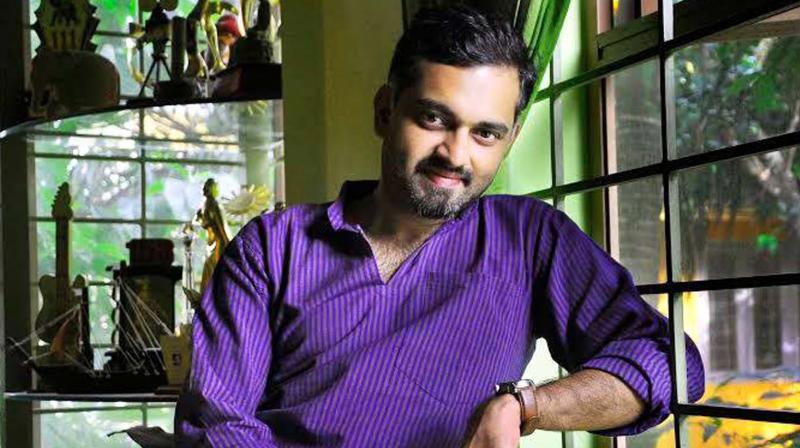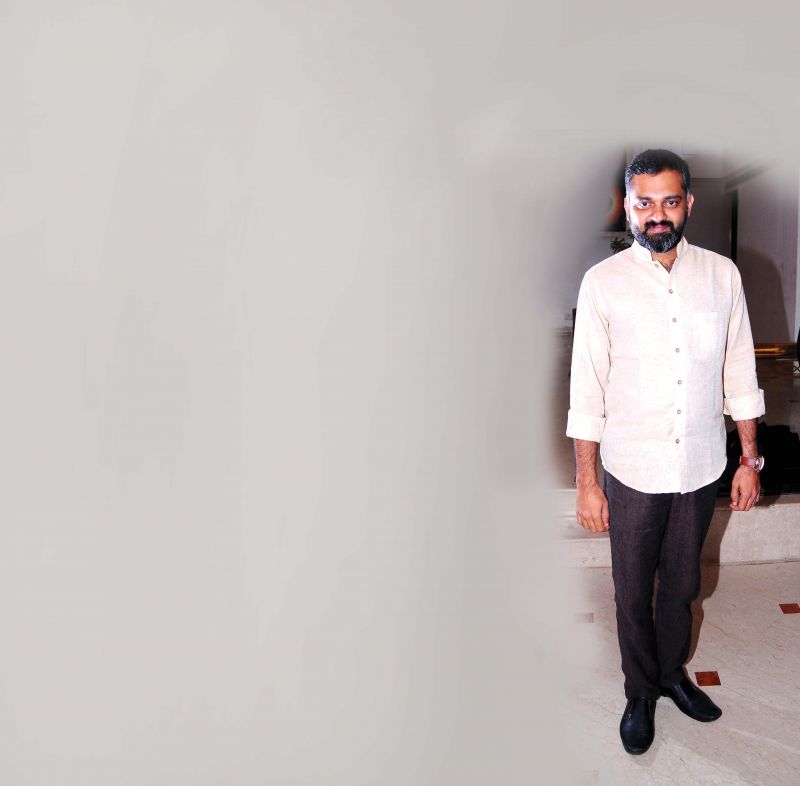Ten years of Bijibal
There've been so many offers recently that Biji who doesn't like saying no, had to start.

His secret of success is having no expectations in life — not back when he came through Lal Jose’s Arabbikatha, not now in the days of Thondimuthal and Cinemakkaran.
It is raining outside. Santhi is on the ground floor, a student with her, picking a new dance lesson. On the floor above sits Bijibal, outside his studio where a recording is just getting over. Wife's dance and husband's music are on two floors of a building with the name Bodhi written on the walls outside, on a road in Padamugal, Kochi. Bijibal waits patiently for a visitor, who comes half an hour late. He brushes off the lateness with his trademark peaceful smile. He looks especially peaceful that Wednesday, dressed all in white, some grey on his recent beard, a soft voice against the sound of untimely noon rain.
That night, he is going to the US for two weeks, another award waiting for him there. There have been a lot of these — four state awards and one national award among them — in the past 10 years in film industry. He winces at the mention of 10. "Johnson Master (late music composer) had once joked that once you cross the 10-year span, you are pretty much done. Will this 10-year label now mean I will be thought of as old stock?" he asks. Surely, he knows it is quite the opposite. Even now, he says he has to finish work of some four or five films, before he heads off to the US. At least three films whose tracks are chartbusters are out there — Thondimuthulam Driksakshiyam, Oru Cinemakkaran, Thrissivaperoor Kliptham. There have been so many offers in recent months that Biji, who doesn't like saying 'no', has just begun doing so. He had to, he has been locked up in his studio so much that there would be days when he doesn't see his children — Devadutt and Daya, both of whom sing too.
"There are many in the family who sing — but it was not times when everyone could come into the field," he says, referring perhaps to the 1990s when he made the leap. He had not thought of coming into films then. He appears so cool about the whole deal that if he were to leave the field today, you imagine him doing so with absolute calm.
Perhaps Lal Jose felt the same wonder when after Arabbikatha, he asked Bijibal, 'you won't be sad if I don't give you another chance?' and Biji took it really well. "He'd have committed to many people about giving chances and he'd want to keep it." In fact, Lal Jose had first contacted Biji at the time of Classmates, gave him the situation where Ente kalbile was later made. "That was after hearing a TV commercial I made for Lunar chappals. I made him a composition, but two weeks later he said, it is not me, but someone else composing for Classmates. He said we will do it another time."
There is no trace of disappointment in Biji's expressions. He is a man with no complaints about life. He had not expected a big break to happen suddenly. "I had not assisted anyone, I didn't know anyone in the industry." But films kept coming to him, in small numbers at first. Daddy Cool came with Aashiq Abu turning a director. "He was my junior, but not in the same college. He was in Maharajas, I in Alberts. But we all knew each other." Nearly all of Aashiq's films got Bijibal's music. There came others — Passenger, Minnamminikootam, Violin, Ozhimuri, through different years and different genres. Ethnic melodies, he calls one of them. Folkish, you deduce is another.
 Bodhi, his music label, was launched to give space to independent musicians.
Bodhi, his music label, was launched to give space to independent musicians.
A marked difference came with Kaliyachan where he touched on classical music in cinema. Musical movies are not so many as once upon a time, Biji says. There was KL 10, a musical with many love songs, but that's a one off. "No use wishing such and such a film would come where you could try such and such music. To do that, I have Bodhi."His label launched to give space to independent musicians who don't find a platform. "It gives you freedom of thought. It needn't be appealing to everyone. Like we have a 12-line song, written by Anil Panachooran, on Gandhi's relationship with Kasturba, what they must have talked about."
Biji rarely sings his songs — that happens only when the kothi (craving) comes. Like singing Varum Varum in Thondimuthalum. But he prefers others. "My only condition is that sing better than me," he laughs. He has a bunch of singers he is comfortable with — that's really important, the comfort. Biji also plays violin for most of his songs. That's where it all began — learning the violin as a fourth grader. His dad took him to the neighbourhood guru, Unnikrishnan. Later he got another guru, Harikrishnan.
Growing up, his interest grew in Carnatic music and he'd go with friends for kutcheris. He used to teach too, back then. But that's all in the past now. Biji has become too busy for anything more than his regular quota of work. Spending quite a lot of his time with his team, some of whom have lasted all 10 years, others going independent. "I am not strict, I don't scold. I joke. We talk about everything from music to politics to gossip." Easy to picture him like that, as he turns with a smile to a lad who comes calling to listen to the new recording. It's time to leave.

